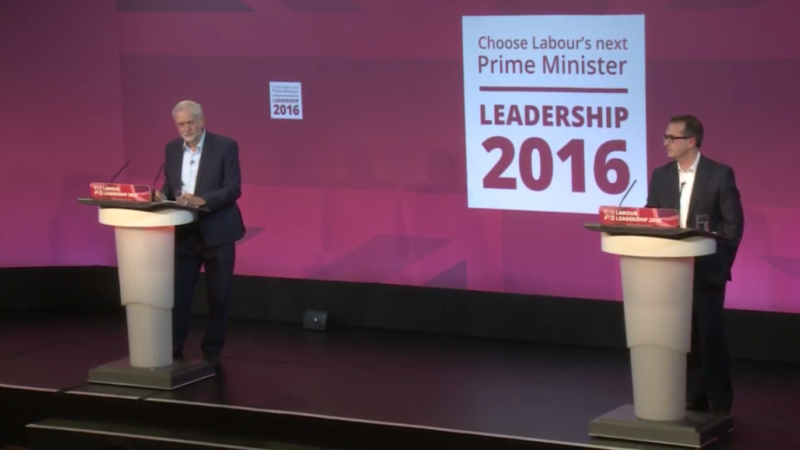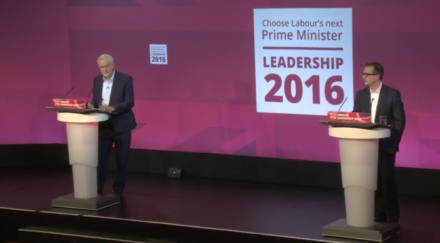

Jeremy Corbyn and Owen Smith went head-to-head for the second time in this leadership contest tonight in a packed hall in Gateshead. Here’s what we learned:
Jeremy has the numbers
The crowds at these events are clearly and vocally still behind Corbyn: not only did he receive the loudest cheers, but some of Smith’s answers were even met with boos.
This is not a particularly scientific measure, but it is the latest to add to the feeling that there has not been the shift in party opinion that Smith would need to pull off an audacious victory next month.
Smith on the offensive
Perhaps because of that, we saw a slightly more bullish Owen Smith tonight. He would occasionally still chip in that he agrees with Jeremy on one topic or another, but overall his criticisms were more pointed.
Extending an early exchange on Brexit, for instance, Smith said that the issue is “probably the biggest difference between me and Jeremy”. This is because the Smith campaign believes that Corbyn’s natural Euroscepticism is possibly his biggest weakness in the eyes of the party’s pro-EU membership. It certainly got a rise out of the Labour leader, who said Smith’s accusations could only come from a “mind reader”. But the challenger hit back: “You’ve been telling us for 30 years!”
The Pontypridd MP drew jeers from the crowd as he noted Labour’s latest 26 per cent poll rating. “I just think we’ve got to be honest with ourselves, comrades,” he protested. “It’s not good enough to say we won a parish council by-election in Thanet.”
He also said that Corbyn had failed in “the basic task of holding together the coalition of the Labour Party”, as evidenced by June’s no confidence vote among MPs.
But it was on the the topic of protest versus power that Smith’s position appeared to have toughened most, with implicit criticisms of Corbyn’s supporters as well as the man himself. “It’s not about the t-shirt you wear or the badge on your lapel; it’s about power,” he implored, to a chorus of boos – later adding that it was no good being “a protest movement talking to itself”.
Corbyn will attack too
Jeremy showed he is no stranger to harder-edged politics either, even if his criticisms were more roundabout.
Realising how the crowd felt about any mention of MPs’ attempts to unseat him, he returned on several occasions to the fact that Smith had resigned from the frontbench, forcing his opponent onto the defensive.
His analysis of Labour’s defeat in 2015 also felt like it came with an implied criticism of Smith, who was much closer to the Miliband leadership.
Corbyn’s supporters see his ideological clarity as a real strength, and so attributing last year’s loss to public confusion over what the party stood for is a sensible appeal in this contest. “We were not offering something totally different to the Conservatives,” Corbyn said, arguing that people were not convinced Labour would “offer an alternative economic agenda”.
It’s clear the frontrunner is ready to spin in order to deal with criticism. He claimed the party was ahead in the polls until Labour MPs starting agitating against him, and used his own constituency’s 70 per cent Remain vote as proof he had done his job well in the referendum. Halfway through the debate, his team launched a new website to rebut the lines against him.
The candidates are condensing their pitches
By adopting a more adversarial tone, the blurred lines between Smith and Corbyn are becoming sharper. Both are retreating into the characterisation of their candidacy: it’s power or principle, professionals or people.
The contest feels like it has harboured greater ill-feeling in the party over the past week, and the bloodletting some hoped for is simply causing deeper wounds. Tonight, that showed.




More from LabourList
Letters to the Editor – week ending 15th February 2026
‘Labour council candidates – it’s tough, but all is not lost’
‘Labour won’t stop the far right by changing leaders — only by proving what the left can deliver’